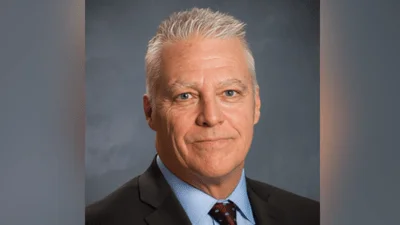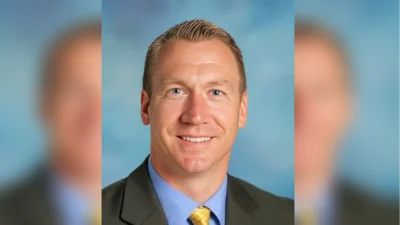Republican candidate Allen Skillicorn, who is seeking the Illinois House seat from District 66, said he views with skepticism Gov. Bruce Rauner’s recently enacted stopgap budget and education funding measure, saying Rauner and the General Assembly actually passed two budgets.
“The ‘grand bargain’ … included more money for Chicago Public Schools, so long as they pass key pension reforms … (and) keep the money the reforms save,” Skillicorn said. “Speaker (Mike) Madigan was dead set against any reforms. I congratulate the governor for finding a way to get Madigan on board with some reforms.”
At a news conference following the passage of the bill, Rauner thanked key staffers for their support, including state Rep. Jim Durkin (R-District 82), Senate Republican Leader Christine Radogno (District 41) and the Republican caucus for standing firm, forcing Democrats to cave on some key issues.
“I would also like to say, personally, a thank you to Senate President John Cullerton (D-District 6) for some flexibility and creativity in the negotiations … compliment (Chicago) Mayor (Rahm) Emanuel for some flexibility and some creativity on his part,” Rauner said. “(The) Democratic caucus has been willing to compromise, and we thank them for their efforts in that regard.”
Rauner’s change in rhetoric came nearly one month after his attempt to get the stopgap budget passed fell flat in the House when Democratic leadership opted not to call the bill to the House floor for a vote and focused instead on a separate bill that was largely viewed by Republicans as a bailout for Chicago Public Schools.
“Let’s be clear: This is just a small step in the process of making Illinois strong and healthy and vibrant,” Rauner said. “This is a small step in the right direction. This is not a budget. This is not a balanced budget. This is not a solution to our long-term challenges. This is a bridge to reform.”
The bipartisan effort will keep the state running until legislators hammer out an actual budget, which Democrats have indicated they do not want to vote on until after the November election, Rauner said. Thanks to the temporary funding, schools across the state will be able to open on time this fall, and services for the state’s most vulnerable residents, including veterans and the mentally disabled, will continue until January.
The plan also allocates funding for infrastructure and for the Department of Corrections. Rauner said Illinois has a history of a political system that is not responsive to the people of the state and success in the passage of the stopgap budget should not be perceived as a substitute for reform.
“Our efforts will never cease to change that,” Rauner said. “We need fundamental reform to change that direction. I believe, I firmly hope that right now we’ve hit the bottom - this is the low point in the evolution of Illinois, and now we begin to move up.”
Durkin, also present at the news conference, commended all legislators on both sides who worked hard to negotiate and accomplish the governor’s plan. “We didn’t get everything that we wanted,” Durkin said. “We will continue to work on a full comprehensive budget, one that is balanced, but today is a good day for taxpayers because we stopped the Democrat majority from passing a $7 billion unbalanced budget on the people of Illinois and every taxpayer.”
Radogno said the stopgap budget did not include a Chicago bailout. “What has traditionally happened in this state when there is a crisis in the city, the city legislators come, hat in hand, and ask for a state bailout," Radogno said. "That did not happen. We held firm on that."
Radogno went on to say that some headway had been made in discussions surrounding possible reform. “I am very pleased to say that one piece of what we passed today was a commitment to address pension reform in exchange for assistance to the city of Chicago with their pension problems,” Radogno said.
In the weeks leading up to the bill’s passage, legislators had come under increased pressure to settle political differences and fund education as the possibility of schools not opening in September became a major concern - a consequence for which neither party wanted to take the blame.
Under the plan, K-12 schools will receive the same amount of funding they received the previous school year, or more, and an additional $80 million in funding will be appropriated to early childhood education. School districts serving students from low-income families will receive a portion of a $250 million poverty grant. Both fund sources will grant Chicago Public Schools approximately $131 million in state funding. Approximately $670 million will go toward immigration services, autism services and youth programs, and an estimated $720 million will be set aside for state facilities to cover utilities, food, medical care, gas and repairs to the state's fleet of vehicles.
Of the approximately $1 billion appropriated to higher education, the state’s nine universities are expected to receive approximately $655 million; community colleges, including City Colleges of Chicago, will get $114 million; and $151 million will be set aside to cover tuition grants for low-income students - making good on a promise made last year.
Rauner said he was cautiously optimistic that the negotiations can eventually lead a constructive resolution after Nov. 8.
“For the remainder of 2016 there will be no tax hike,” Skillicorn said, summarizing the results. “The stopgap budget is only for six months, so Illinois Republicans need to pick up a couple seats in the fall. The Nov. 8 election will be a referendum on the tax hike Speaker Madigan and his minions have planned.”
Skillicorn warned constituents to anticipate a tax hike if Democrats stay in the majority.
"This year the tax hike referendum runs right through McHenry County,” Skillicorn said. “Both Steve Reick (the Republican candidate in House District 63) and myself have Madigan supported opposition that, if elected, will further Speaker Madigan’s death grip on Illinois’ finances. This will not be the year to sit it out or watch from the sidelines.”






 Alerts Sign-up
Alerts Sign-up